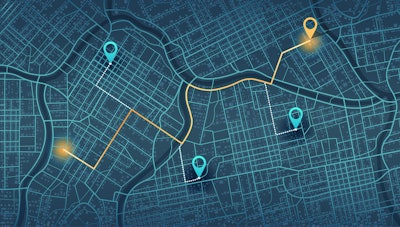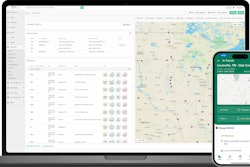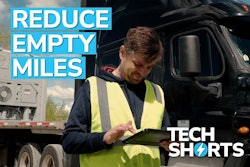
The trucking industry is the backbone of modern commerce, transporting goods across vast distances to keep shelves stocked and industries profitable. This crucial sector is often faced with rising fuel costs, regulatory standards and the need to optimize efficiency.
In the midst of these challenges, technology has emerged as a key player in transforming the future of trucking, specifically GPS tracking and fleet telematics.
Benefits of GPS tracking
The constant need to maximize efficiency has propelled the trucking industry into the age of technology-driven transformation. At the forefront of this revolution is telematics; a fusion of telecommunications and informatics. In the context of the trucking industry, telematics encompasses a wide array of applications, with one of its central components being GPS tracking. This technology involves equipping vehicles with GPS devices that communicate their real-time location, speed, and other relevant data to a central system.
Enhanced fleet visibility
Knowing the precise location of each vehicle in your fleet is paramount, and GPS fleet vehicle tracking system brings forth a multitude of benefits in ways that were previously unimaginable. GPS tracking provides fleet managers with up-to-the-minute location data for every vehicle in the fleet. Fleet managers can define virtual boundaries or "geofences" on digital maps. When a vehicle enters or leaves these designated areas, the system triggers instant notifications.
Route optimization
GPS tracking systems analyze historical and real-time data to identify the most efficient routes, taking into account factors like traffic, road conditions, and delivery schedules. GPS tracking allows for accurate prediction of arrival times, enabling companies to meet delivery windows consistently.
Asset and cargo security
GPS tracking systems can alert fleet managers to unauthorized vehicle usage or suspicious activities. In the unfortunate event of theft, real-time tracking assists law enforcement in recovering stolen vehicles and assets quickly. For companies transporting perishable goods or pharmaceuticals, GPS tracking provides constant monitoring with temperature sensors integrated with tracking systems to send alerts if cargo temperatures fall outside specified ranges.
Driver safety and compliance
GPS tracking systems record a wealth of data related to driver behavior, including speed, harsh braking and acceleration. Fleet managers can use this information to provide feedback and training to drivers, promoting safer and more efficient driving practices. Electronic Logging Devices (ELDs) are a crucial component of regulatory compliance. GPS tracking systems often integrate seamlessly with ELDs, ensuring accurate and automatic recording of hours of service.
Cost savings and ROI
Implementing GPS tracking technology isn't just a technological upgrade; it's a strategic investment that yields substantial cost savings and a significant return on investment (ROI). By monitoring vehicle health in real time, GPS tracking systems can identify potential maintenance issues before they lead to costly breakdowns. Some insurance providers offer discounts to fleets equipped with GPS tracking systems, as these systems improve driver safety, reduce the risk of accidents, and enhance asset security.
The future of telematics in trucking
As technology continues to advance at a rapid pace, the future of telematics in the trucking industry looks promising and transformative. In this section, we'll explore the emerging trends and developments that are poised to shape the future of telematics.
AI and machine learning have become integral components of modern telematics systems, revolutionizing fleet management practices. These technologies facilitate predictive analytics, enabling fleet managers to anticipate maintenance needs, identify potential issues, and optimize routes with an unprecedented level of accuracy.
Predictive maintenance
Through AI-driven algorithms, historical vehicle data is meticulously analyzed to predict when maintenance is required.
Advanced route optimization
Machine learning algorithms continuously process real-time data, including traffic and weather conditions, to make informed decisions regarding route optimization.
Blockchain for secure data sharing
Blockchain technology is gaining traction within the telematics landscape, offering enhanced security and transparency in data sharing practices. It is being employed to safeguard the integrity and immutability of data, making it especially valuable in applications such as verifying the accuracy of electronic logs and securely sharing data among stakeholders in the supply chain.
Sustainability and Environmental Impact Environmental concerns are prompting initiatives to minimize the industry's impact on the planet.The trucking industry is at a pivotal juncture when it comes to sustainability and environmental impact, with two significant developments on the horizon: the rise of electric and autonomous vehicles.
As electric trucks become increasingly prevalent, telematics technology will assume a critical role in overseeing their operations. For example, platforms like the Blink Mobility App leverage GPS tracking for efficient electric vehicle management. Furthermore, telematics will be instrumental in monitoring battery health, optimizing charging schedules, and ensuring the efficient performance of electric fleets.
The promise of autonomous trucks is also generating considerable excitement due to their potential to enhance safety and efficiency. Telematics will be indispensable for managing and overseeing autonomous vehicles, collecting vital performance data, and ensuring strict adherence to regulatory standards.
By embracing telematics and its cutting-edge components, the trucking industry can navigate the challenges ahead and thrive in an era of change. With GPS tracking for fleets as a trusted companion, trucking companies can embark on a journey towards a safer, more efficient, and sustainable future.










